It wasn’t until he was in high school, applying for his driver’s license and to colleges, that Rafael Agustín found out he was an undocumented immigrant. Moving from Guayaquil, Ecuador, to Walnut, California, at the age of seven, the now 42-year-old award-winning television writer (Jane the Virgin) and CEO of the Latino Film Institute (LFI) knew he and his parents were immigrants but was unaware of the illegality of his own status.
“That’s when my parents had the talk with me, which, for immigrants, is not the birds and the bees, it’s completely different,” Agustín said. “And when my all-American life came crashing down on me, because I grew up thinking I was just a dumb, oblivious white kid with a great tan, when I realized that I was undocumented, the trajectory leading me to college, trying to get a good career and a good job, stopped.”
Finding his passion and voice
Unsure of how long he would be burdened with his status and no financial aid, Agustín attended Mount San Antonio College, where he began taking every course under the sun, alphabetically. It was there that he discovered both his love for the entertainment industry and his voice.
“Think about how many classes I took before I got to ‘T’ for theater,” Agustín said. “Then, I got into speech and debate after that, so I started finding my self-esteem and my self-worth in performance. First, in theater, because performing someone else’s words is where I started building my self-esteem and self-respect, but in speech and debate, I got a chance to write my own speeches and I was like, ‘Oh, my god, I’m finding my voice.”
Learning about his gift for performance and his newfound passion for the arts, the TV writer applied to the University of California, Los Angeles’s (UCLA) School of Theater, Film and Television, where he later earned a Bachelor’s and Master’s. On the day of his acceptance to the program, he also received his green card from the United States government in the mail.
“My parents and I held each other and cried and just fell on the floor,” Agustín said. “After 14 or 15 years of uncertainty for them, in particular, their huge monumental sacrifice had finally paid off. They were very scared. Imagine telling immigrant parents you want to work in film and TV. I went off to UCLA on an acting scholarship and quickly discovered there were no roles for Latinos and Latinas. I was like, ‘Oh, I get it, I have to write my own opportunities. I have to write myself into existence.’”
This realization led Agustín to playwriting, where he then wrote “N*W*C,” alongside Allan Axibal and Miles Gregley, two fellow students and performers, along with Liesel Reinhart and Steven T. Seagle, an autobiographical comedy student production that intertwines hip-hop, theater, slam poetry and real-life stories to depict stereotypes and discuss the topic of race itself. The show debuted in 2004 and became a cult phenomenon, touring for a decade in over 42 states and awarded for its impact on social justice within the arts.
Following its immense popularity, there were discussions of turning the show into a television series, but, unfortunately, it didn’t move forward, which, according to Agustín, despite his determination to adapt the show, was his first writing heartbreak.
“The worst part was that I kept trying to create the show that everyone around me wanted to make—the producers, the directors, the showrunners, the network and the studio,” Agustín said. “When it didn’t work, it was my fault; it wasn’t everyone else’s fault. I always tell young writers that that was my biggest lesson in Hollywood. ‘Success has many parents, but failure is an orphan.’ When it failed, that was my fault, but I’m sure if it would have succeeded, everyone would have taken credit. I was a little sad and disillusioned by my first TV development experience and my TV writing experience.”
Although “N*W*C” was his first playwriting experience, giving him a taste of what Hollywood had to offer, his big break was becoming a 2016 Sundance Episodic Fellow for his take on the Latino “Wonder Years,” which became his TV family comedy, Illegal, which he sold to CBS Studios.
“I began writing the Latino “Wonder Years”; that’s what was in my head,” Agustín said. “How do I tell my story, my undocumented story, my all-American experience, discovering that I’m undocumented? Then I was accepted into the Sundance Institute; they have an episodic fellowship, and that’s really what kicked off my career, when Sundance accepted me.”
In 2017, when the Jane the Virgin‘s writer’s room needed a new writer, showrunner Jennie Snyder Urman reached out to Agustín, which led him to write for seasons four and five of the telenovela.
“That was my entry to Hollywood and my entry into TV writing,” Agustín said. “And the rest is history.”
Los Angeles Latino International Film Festival
It was on the set that he reunited with his longtime friend Gina Rodriguez, well-known for her role as Jane Villanueva on the show, with whom he met while volunteering for the Los Angeles Latino International Film Festival (LALIFF), the largest Latino film festival in Los Angeles, which is committed to showcasing film, television, music and art through the Latino perspective under the umbrella of LFI, in 2004.
The festival was co-founded in 1997 by actor and film producer Edward James Olmos, well-known for his roles as Lieutenant Martin “Marty” Castillo in Miami Vice (1984-1990), William Adama in Battlestar Galactica (2004-2010), Montoya Santana in American Me (1992) and Abraham Quintanilla in Selena (1997), along with Marlene Dermer, Kirk Whisler and George Hernandez.

TV writer, producer, author and CEO of the Latino Film Institute, Rafael Agustín, has written for the CW’s Jane the Virgin and released his first-ever book in July 2022, Illegally Yours: A Memoir.
“I first heard about it when I was a student at UCLA,” Agustín said. “We were doing a Chicano theater play, so it was nothing but Latinos in the class, and [LALIFF] said, ‘You should consider volunteering because this is where the Hollywood industry and the Latino community intersect.’ I was like, ‘How beautiful, that’s what I’ve been looking for!’ I showed up and met Edward James Olmos for the first time and he was so inspiring. His heart truly belongs to the mission of the community.”
Despite being on tour, Agustín never failed to take a month off to help produce the film festival, which was only the beginning of his relationship with LFI. First showing up to unfold tables and chairs for students involved in the Youth Cinema Project (YCP), which is, according to its website, “project-based learning that produces competent, resilient, real-world problem-solvers and bridges the achievement and opportunity gaps by creating lifelong learners and the entertainment industry’s multicultural future,” to then being part of the festival’s production, the writer supported the event until it took a hiatus in 2013.
Although LALIFF, which is the home to the first films by Academy Award-winning directors, Guillermo del Toro, Alfonso Cuarón, Alejandro G. Iñarritu and Pablo Larrain, halted exactly 10 years ago, the fear that the YCP would go along with it made Olmos determined to make it a priority. Because of his continuous support of the project and the nonprofit as a whole, Olmos offered Agustín the role of Executive Director in 2017, which was a position he was hesitant to accept as the TV writer had just begun working on Jane the Virgin.
“He said, ‘Please go to a classroom and see what we’re doing.’ I saw nine-year-olds do the work that I wasn’t allowed to do until I got to UCLA. It nearly made me cry,” Agustín said. “I was like, ‘This is it. This is how we change Hollywood. This is how we bring not just Latinos, but minorities, disenfranchised people and historically marginalized communities to Hollywood. We can’t start development at the college level like I did, we have to start this early.’ We’re not trying to create filmmakers, we’re trying to create lifelong learners and if any of them want to work in the industry, then we have a pipeline of how to do it.”
LatinX animation
After seeing the success of the YCP in 2018, Olmos and Agustín decided to bring LALIFF back on a volunteer basis to prove how much the festival truly mattered to the industry and the community. The following year, in 2019, YCP and LALIFF united with LatinX Animation, which was founded with the goal of building a community for Latinx professionals in the animation, VFX and gaming industries.
“LatinX animation is monthly workshops and networking events,” Agustín said. “They will invite someone like Phil Lord to talk about Into the Spider-Verse to a group of LFI members who want to learn more about the animation industry. They get to network and then we start connecting them to job opportunities and job openings. It’s something that has not been done for the LatinX and Latino community and the animation industry, which is only growing.”
A few years later, in 2021, LFI was constructed as a nonprofit and as an umbrella for YCP, LALIFF and LatinX Animation, which Agustín became the CEO of in April of the same year. The following year, on July 12, the TV writer released his first-ever book, Illegally Yours: A Memoir (Grand Central Publishing), a comedic memoir about growing up undocumented, which was selected as a Barnes & Noble “Priority Title” and an Apple Books “Must Listen.”

Rafael Agustín featured in a magazine. : Courtesy of Rafael Agustín.
As he continues his career as a TV writer and LFI’s CEO, Agustín remains passionate about depicting the unique Latino American experience from outside perspectives and expanding Latino representation within the entertainment industry.
“Things are slowly moving. We kill it in the culinary world, the music world and the sports world, but here’s our last frontier: film and TV. It’s going to be a huge movement of not just the actors, the directors, the writers, but we’re going to need people in positions of power on the other side because, to tell you the truth, my career in Hollywood didn’t take off until people in the room on the other side started looking more like me. That’s when things started to change.”
CALÓ NEWS sat down with Agustín to discuss, more in-depth, the LFI, the 2023 writer’s strike, his established career and the need for more Latino representation in entertainment.
RAFAEL AGUSTÍN, 42, ALTADENA, CALIFORNIA, TV WRITER, AUTHOR AND CEO OF LATINO FILM INSTITUTE, HE/HIM, LATINO
WHAT IS THE HISTORY BEHIND LALIFF?
It was formed in 1997 as an initiative by the city of Los Angeles. Four founders at the time, Edward James and Kirk Whisler on one side and Marlene Dermer and George Hernandez on the other. They came together and created this international Latino Film Festival. The first film festival was in the back lot of either Paramount or Universal. Mr. Olmos always shares how the first filmmakers that he brought with their short films were unknown, everyone was unknown at the time, like Guillermo del Toro and Alejandro G. Iñarritu back in ‘98 or something. That’s what LALIFF has always been, [a place] to find the next generation of storytellers. Pablo Larrain had his first two films here before he did Jackie with Natalie Portman and was nominated for an Oscar. We had America Ferrera’s first film, Gina Rodriguez’s first film. That has been the legacy and the history of LALIFF and, in the past few years, it’s only grown more powerful because we partnered up with Netflix and created the Inclusion Fellowship. Now, my concern for our community in Hollywood has always been access and funding. How do we close that gap? And when we partnered up with Netflix, we said, ‘If you give us the money, we will curate the talent and fund them just go out there and do their films.’ And that’s what we’ve been doing for the past three years. I will say that, in the past two years, one of the selected fellows has gone on to qualify for the Oscar for Best Short Film for two consecutive years. That’s how powerful the program is. We’re probably the only organization in the United States, but definitely the only Latino organization in the United States, that has a pipeline from public school with the Youth Cinema Project all the way to potentially the Oscars with the work that we do at LALIFF. That is the power of the Latino Film Institute.
SINCE BECOMING CEO WHAT DIRECTION HAVE YOU TAKEN THE ORGANIZATION? WHY IS IT AN IMPORTANT RESOURCE FOR LATINOS?
At the very beginning, LAIFF was always known as a powerful international Latino film festival. We have had Pedro Almodovar films at LALIFF, we opened up with his films one year. We’ve had Antonio Banderas, and we’ve had the biggest names in the international Latin American market and industry, but what about the U.S. Latino? That was always the problem. I strongly feel that in Colombia, Mexico and Argentina, a lot of these industries get subsidized by their governments. There is a lot of development work for their filmmakers and their talent but that work doesn’t happen in the United States. That’s why for the longest time, to me, U.S. Latinos couldn’t compete with the international Latin American, because they were getting blown out of the water. My focus, since taking on a leadership role, has been on the U.S. Latino and Latina. I want to make sure that American Latinos are getting the support that they need, which is why we created this fellowship with Netflix, which is why we created a Works in Progress program with Amazon Studios. With all of these things, how do we support the Latinos in the United States?
ARE THERE ANY FUTURE PROJECTS OR ASPIRATIONS FOR LALIFF THAT YOU CAN TELL US ABOUT?
I will say that, for me, it’s about access and funding and we’re able to do that with our partnerships with Netflix and Amazon. We just had a collaboration with Warner Brothers, who, in celebrating their 100th anniversary, selected us to be their partners, because they’re giving out $220,000 per filmmaker to re-imagine a classic Warner Brothers film. They opened it up to six filmmakers, and two out of the six were from us, from the Latino Film Institute and LALIFF, which is beautiful. I feel like the next step, the next natural step, is how do we continue to do that work? How do we amplify that work? Perhaps it’s helping people fund their first film project. I have big hopes for what the future could be, but the core of our work will always be the work with the students in the community with the Youth Cinema Project.
WHAT IS YOUR OPINION ON THE 2023 WRITER’S STRIKE AND WHAT ARE ITS OVERALL IMPACTS? HOW DOES IT IMPACT LATINOS IN THE BUSINESS AND AS CONSUMERS?
I’m a proud member of the Writers Guild of America and the WGA Negotiating Committee pointed out beautifully that what’s at stake in these conversations is the preservation of writing as a profession. To me, the WGA has already negotiated. Everything that we’re fighting for right now has already been negotiated. The first provision for residuals was negotiated in 1953. That was 70 years ago. Why are we still here fighting for residuals? Minimums have already been negotiated, why are we still fighting? It’s because of the disruption of the tech companies. The disruption of the tech companies and streaming services have changed the ecosystem of Hollywood and, if you take a step back, there are a couple of things that you realize. You realize that this is what tech companies do. When you think about Spotify, Airbnb and Uber, the conveniences of these services come on the backs of workers, the music industry, the hotel industry and the taxi driving industry. What I believe tech companies didn’t see coming is coming into Hollywood, which is a majority union town. When we think about unions in the United States, in the mid-50s, it was the highest we had been at, around 35%. I believe 35% of the labor force was part of a union in the United States. Today, it’s less than 10%. So there has been a destruction, a purposeful destruction of unions in the United States, but Hollywood is not like that. Everyone who works in Hollywood, if it’s not an indie film or reality TV, everyone’s part of a union. I’m talking about the Teamsters, the Directors Guild of America, the WGA and SAG-AFTRA. That is what the tech companies and streaming services have faced in Hollywood. And that’s why we have to take a stand.
This is the labor fight of our generation. We have to show that labor can stand up against tech companies to fight for the preservation of our livelihoods. We have the five-day work week and we have vacations and time off and weekends off because of labor movements in the United States. That’s why I find this strike very, very important. When I’m on the picket line, what’s so fascinating to me is that the people who honk in support, they’re not usually the expensive Teslas that drive by, they’re always the bus drivers. They’re always the electrical trucks, the big rig trucks or the county utility vehicles; it’s always other labor union members who are honking in support for us on the picket line and that’s what’s so beautiful to see. That’s why this strike is so critical.
Everyone tells me that the difference between this writer’s strike, as opposed to the last one, which happened 20 years ago, is the amount of youthful and diverse writers out on the picket lines. These are for folks who are emerging and trying to enter the industry and are having a very difficult time. The way Latinos are impacted, in my eyes, is because diversity is always the first thing that gets sacrificed when there has to be cuts. The idea of Mini Rooms is, for example, Jane the Virgin, a broadcasted show, meaning it airs on TV for free because of advertising, that’s what pays for it. Our season was 20 episodes. When you’re on a streamer, you’re usually doing half of that, which is 10. The idea is, “Okay, we’re doing less because our business models are different.” In broadcast, you want more viewerships; in streaming, all you care about are subscribers, you don’t care about the viewership. You get more subscribers by having new shows, so that’s why it’s more beneficial to have two shows with 10 episodes, as opposed to one show with 20 episodes each. That has introduced the concept of the “Mini Room,” fewer writers to do the same amount of work even though they’re saying it’s less work because there are fewer episodes. When you have mini rooms, the first people that get sacrificed are the people with no experience, people with entry-level experience and those are always people from marginalized communities. That’s how we’re being affected, by turning Hollywood from a real writers’ room to a mini room. The people who get left behind are usually minorities, people of color.
YOU WERE A WRITER ON THE AWARD-WINNING THE CW SHOW, JANE THE VIRGIN. WHAT WAS THAT EXPERIENCE LIKE?
I haven’t seen anything like it. An idea of a Latina family–three generations of Latinas–on primetime television? I don’t think there’s been anything like it since. It’s heartbreaking that there hasn’t been anything like it since. I thought it showed the hunger for it, I thought it did such a beautiful job at being culturally specific, but still commercially universal for all families. And I was so proud to be a small part of that. I was able to fight to get our cultural specificity into the show. I was so proud to be able to fight for the importance of Vicks VapoRub in a Netflix show for our community. But it’s truly the honor of my career to be able to be part of, to me, a very important TV show. Not just in the TV landscape, but within the Latino community in the United States.
YOUR NEWLY RELEASED COMEDIC MEMOIR, ILLEGALLY YOURS (GRAND CENTRAL PUBLISHING), WAS SELECTED AS A BARNES & NOBLE “PRIORITY TITLE,” AS WELL AS AN APPLE BOOKS “MUST LISTEN.” WHAT IS YOUR BOOK ABOUT, AND WHAT DROVE YOU TO BECOME AN AUTHOR?
My book was always about what it means to be American. That’s what it was really about. I felt like post the past presidency that we had, we needed to heal as a nation, and part of that was us taking back our narratives. On the heels of being called criminals and rapists, I wanted to show the positive side of that. I had no shame in taking on this dialogue and debate on undocumented immigrants. I don’t think we have seen a book about that community with this much humor and heart. I brought so much of Jane the Virgin to the book in terms of my storytelling. It’s not a model minority myth at all, I wanted to show our struggles, warts and all. We deserve it. If we’re contributing to this economy and we’re only enriching this country, then we have a right to be here. It’s the way that I think about it. It’s all of my lessons throughout my life, including learning not to use the word illegal. The word that I used to use because it’s the word that everyone used around me. It’s crazy to internalize a word like illegal, right? Because then you’re a criminal. And that’s by design.
IN 2018, LA WEEKLY NAMED YOU ONE OF THE FIFTY MOST ESSENTIAL PEOPLE IN LOS ANGELES AND, IN THE SAME YEAR, THE UNITED NATIONS INVITED YOU TO SPEAK AT THEIR 70TH ANNIVERSARY CELEBRATION OF THE UNIVERSAL DECLARATION OF HUMAN RIGHTS. AND, IN 2021, YOU WERE APPOINTED TO THE NATIONAL FILM PRESERVATION BOARD AT THE LIBRARY OF CONGRESS. WHAT DOES IT MEAN TO YOU TO REPRESENT THE LATINO COMMUNITY THROUGH YOUR MANY SUCCESSES?
This year, I joined the board of directors of Mother Jones, which is the oldest nonprofit investigative newsroom in the United States. It’s crazy to think that I went from being undocumented to sitting on a board at the Library of Congress. It’s also crazy that I went from being an English learner to writing for English-language television. All of it is crazy, but I think, to me, that’s just proof that anything is possible. That’s something my mom instilled in me early on. We had a lot of barriers along the way, of course, we were undocumented, for crying out loud, but I didn’t let any of that stop me. I always say, “Okay, I’ll work my way around it, I’ll work my way around that.” The thing that changed my life, and I wrote it in the book, is when I learned the truth about being undocumented. I got depressed, my all-American life came crashing down on me and I asked my mom, “You tell me everything. You’re like an oversharer. Why didn’t you tell me this very important thing?” And she said, “Your dad and I didn’t want you to grow up feeling different because dreams should not have borders.” That’s it, that’s what changed my life. It was her saying that it was the idea that dreams should not have borders. It was my mother allowing me to dream freely and wildly, despite our circumstances, that I always found a workaround to keep going.
What I’ve learned from the Youth Cinema Project is that if you can see it, you can dream it and you can become it. And if anything, I just hope there’s someone out there who’s like, “I want to be a CEO,” or “I want to work in a nonprofit, I want to work in Hollywood, I want to write,” whatever it is, that they can see that there’s an example. “If Rafa did it, I could do it,” because they can absolutely do it. It hurts me that we’re one of the largest minority groups in the United States, but we’re the least represented. It’s clear that we have so much work to do, especially culturally, and the images that we see on the big and small screens, it is my belief that we are years, if not decades, away from establishing the Latino identity. It will happen, it’s inevitable. Every other community before us came together and did it themselves, but there’s no reason why we can’t do it. We’re just very, very far behind and a big part of that comes from the many different nationalities and those feelings in between. There’s also a lot of racism and colorism that we haven’t addressed in the community and I think we’re going to be in the middle of all of these conversations for the years to come before there is a true Latino identity, because, once it’s created, once we understand our economic power, our buying power, political power, it’s game over.
DESPITE GROWTH OVER THE YEARS IN THE ENTERTAINMENT INDUSTRY, THERE IS STILL A HEAVY LACK OF LATINO REPRESENTATION. WHAT ARE YOUR THOUGHTS ON THIS, AND WHAT SHOULD BE DONE TO CHANGE THIS?
I think people need to understand that Latino identity is an American identity. Once we do that, it’s going to be better. The thing I tell all young, Latino and Latina writers is always that they have to understand that Latino is not a genre. I think a lot of times people say, “Oh, that’s a Latino story, that’s a Latina TV show.” That’s a losing proposition because we alienate people who are not Latino and even Latinos don’t want to watch that. Murder mystery is a genre, Sci-fi is a genre, romantic comedy is a genre, and Latino, that is just the icing on the cake, but it’s not the genre. I think what needs to happen, moving forward, is we have to create shows, books, plays and films that are very commercial and the fact that they are Latino is just an extra, not the thing. I think once we do that, we’re going to be a lot more successful. Personally, all the TV projects I’m developing right now, yes, they’re about Latino and Latina families and characters, but the genre itself is the commercial thing. That’s what I’m trying to do. It’s kind of what I tried to do with this book, I was like, “How do I tell a comedic, all-American story via memoir? Oh, and they just happen to be undocumented.” That’s how I feel about our stories and our films. We need to get to that mature level of storytelling that we’re still far away from. But we’ll get there, it’s gonna take time.
BECAUSE OF THIS UNDERREPRESENTATION, LATINO YOUTH MIGHT BELIEVE THERE IS NO ROOM FOR THEM IN THE INDUSTRY. WHAT ADVICE DO YOU HAVE FOR THEM?
Hollywood is an industry that runs on stories, so no matter what anyone tells you, the storytellers have all the power. It’s not the agents, the managers, the producers, the financiers … it’s the storytellers. As long as they know how to tell a great story, they’ll always work. And as you can see, because there’s a lack, there’s a necessity for them. I think we’re seeing, ‘Oh, wow, stories that are diverse actually make a lot of money.’ Black Panther, Crazy Rich Asians, Coco. I think it’s a great business decision to be investing in these young storytellers in the future.

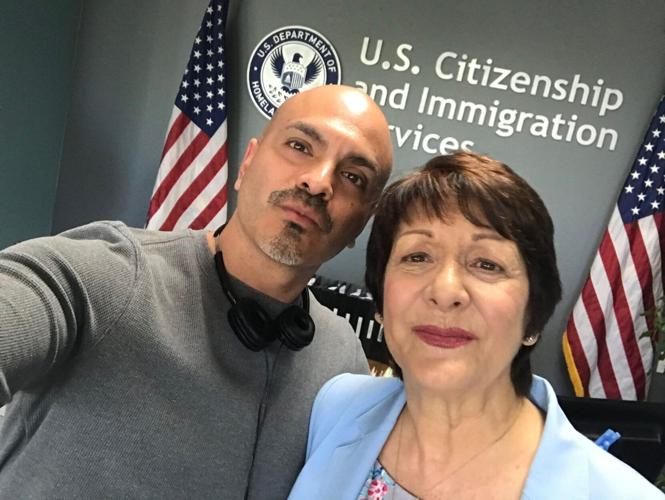

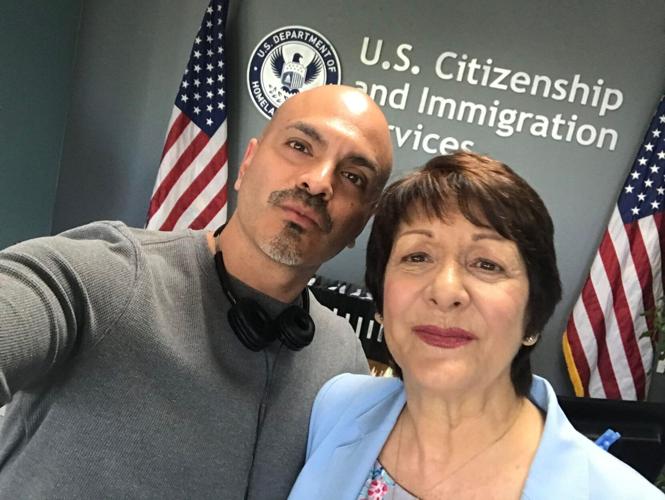

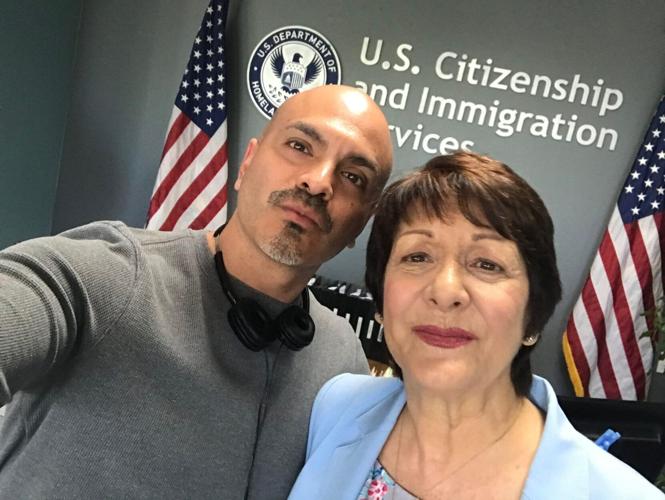

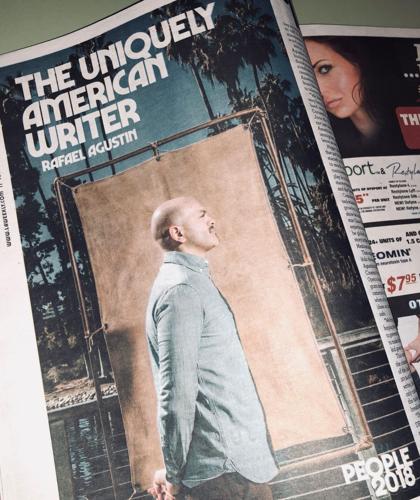
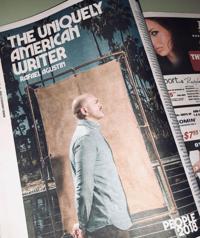







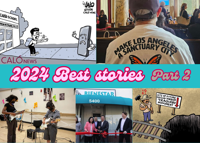
(0) comments
Welcome to the discussion.
Log In
Keep it Clean. Please avoid obscene, vulgar, lewd, racist or sexually-oriented language.
PLEASE TURN OFF YOUR CAPS LOCK.
Don't Threaten. Threats of harming another person will not be tolerated.
Be Truthful. Don't knowingly lie about anyone or anything.
Be Nice. No racism, sexism or any sort of -ism that is degrading to another person.
Be Proactive. Use the 'Report' link on each comment to let us know of abusive posts.
Share with Us. We'd love to hear eyewitness accounts, the history behind an article.